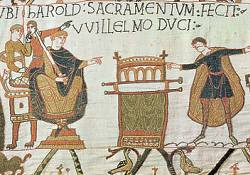William's claim to the English throne was based on his assertion that, in 1051, Edward the Confessor had promised him the throne (he was a distant cousin).
 Norman sources emphasise the fact that during his stay in Normandy, Harold was bound to William by many oaths, which enabled them to characterise the assumption of power in 1066 by Harold on the death of Edward, as a betrayal. This was a justification a posteriori for the Conquest, and the Bayeux Tapestry is particularly clear on this aspect. Furthermore, William had the support of Emperor Henry IV and papal approval. Norman sources emphasise the fact that during his stay in Normandy, Harold was bound to William by many oaths, which enabled them to characterise the assumption of power in 1066 by Harold on the death of Edward, as a betrayal. This was a justification a posteriori for the Conquest, and the Bayeux Tapestry is particularly clear on this aspect. Furthermore, William had the support of Emperor Henry IV and papal approval.
|